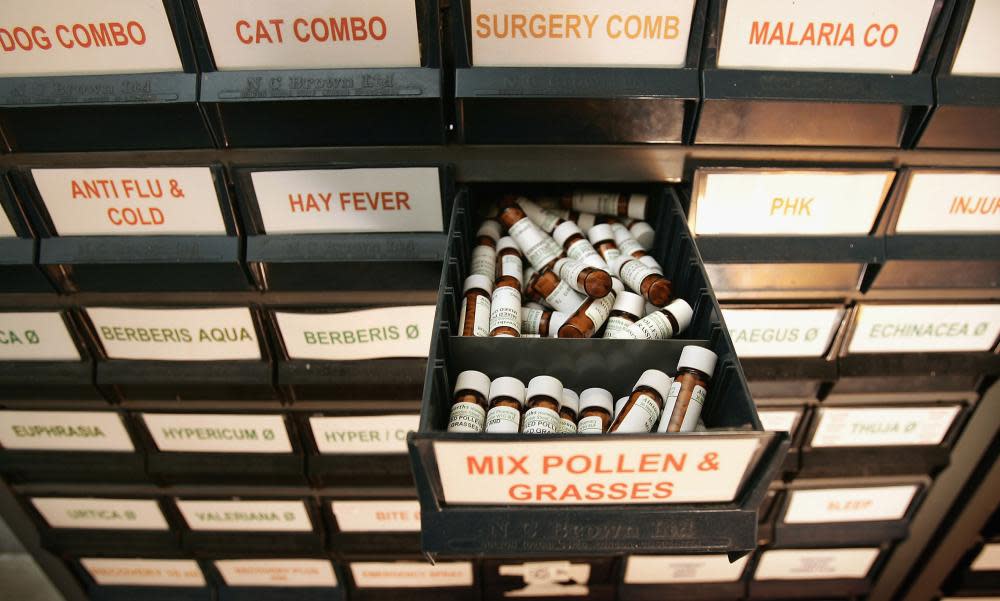Homeopathic products should not be sold in pharmacies – review

Homeopathic products should not be sold in Australian pharmacies because they place consumers at “unacceptable risk”, an independent review of pharmacy regulation for the health department has found.
In his interim report the chair of the review panel, Prof Stephen King, found homeopathy and homeopathic products should be kept out of pharmaceutical benefits scheme-approved pharmacies.
“The only defence put to the panel regarding homeopathy was that it was harmless and able to be used as a placebo in certain circumstances,” the report found. “The panel does not believe that this argument is sufficient to justify the continued sale of these products in pharmacies.”
Ian Carr, a pharmacist and member of Friends of Science in Medicine, welcomed the finding, and said homeopathic products could be harmful if used in lieu of evidence-based treatments for serious conditions.
“My biggest complaint about the status of homeopathy is not that people are essentially putting placebos into their bodies, it’s that they are putting their trust in a certain way of thinking that has no evidence base,” he said.
“It means they’re not looking in the right places for information, which is concerning if they are suffering from serious health problems. Yes, there is always a small risk that scientifically proven medicines carry, but those medicines also offer a huge benefit.
“Homeopathy carries a small or medium risk with no benefit.”
Homeopaths believe that illness-causing substances can, in minute doses, treat people who are unwell, and dilute these substances in water or alcohol. They claim the resulting mixture retains a “memory” of the original substance that triggers a healing response in the body.
These claims have been disproven by multiple studies. In 2015 the National Health and Medical Research Council reviewed 225 research papers on homeopathy and found there were “no health conditions for which there is reliable evidence that homeopathy is effective”.
“People who choose homeopathy may put their health at risk if they reject or delay treatments for which there is good evidence for safety and effectiveness.”
An independent company reviewed the council’s analysis and appraised the evidence to prevent bias, drawing the same conclusions.
Carr said the interim report on pharmacy regulation was not tough enough on the wider complementary and alternative medicine sector.
In September the government announced a more comprehensive system of post-market monitoring of products, which will provide the Therapeutic Goods Administration with better information about emerging safety issues.
Because of these and other changes under way, King said, the panel had made no further recommendations on CAM products.
But Carr said he would liked to have seen a more critical look at the sale of CAM products in pharmacies by the panel.
“I’m particularly concerned by pharmacies that place naturopaths in the pharmacy environment, given naturopaths promote treatments that are unscientific and unproven,” he said.
A professor of public health and medicines policy expert, Ken Harvey, agreed.
“There should be a completely separate section for CAM products and there should be a clear sign in that section that tells customers: ‘These products have not been evaluated by government to see if they work and they may interact with medications. Talk to a pharmacist,’” he said.
The report also found that community pharmacy expenditure and funding was “insufficiently transparent”, a concern given that community pharmacies draw funding from a range of federal, state and territory government programs.
The Pharmaceutical Society of Australia president, Joe Demarte, said the interim report had raised some concerning issues for the sector.
“We will consult with members from all areas of practice to comprehensively assess the interim report, which will inform PSA’s detailed response,” he said.
The report will be open to public submissions until 23 July.

 Yahoo News
Yahoo News 
